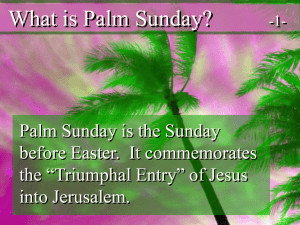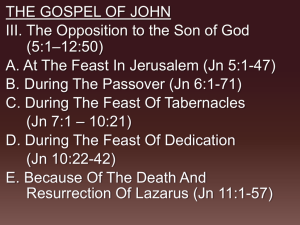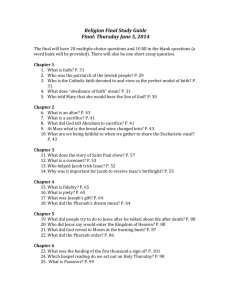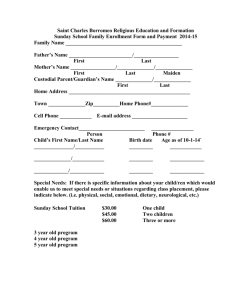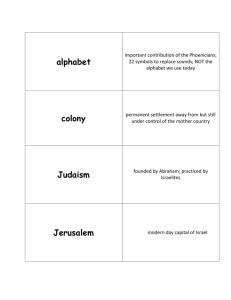Preaching Notes Passion/Palm Sunday.B.2015 If you choose to
advertisement
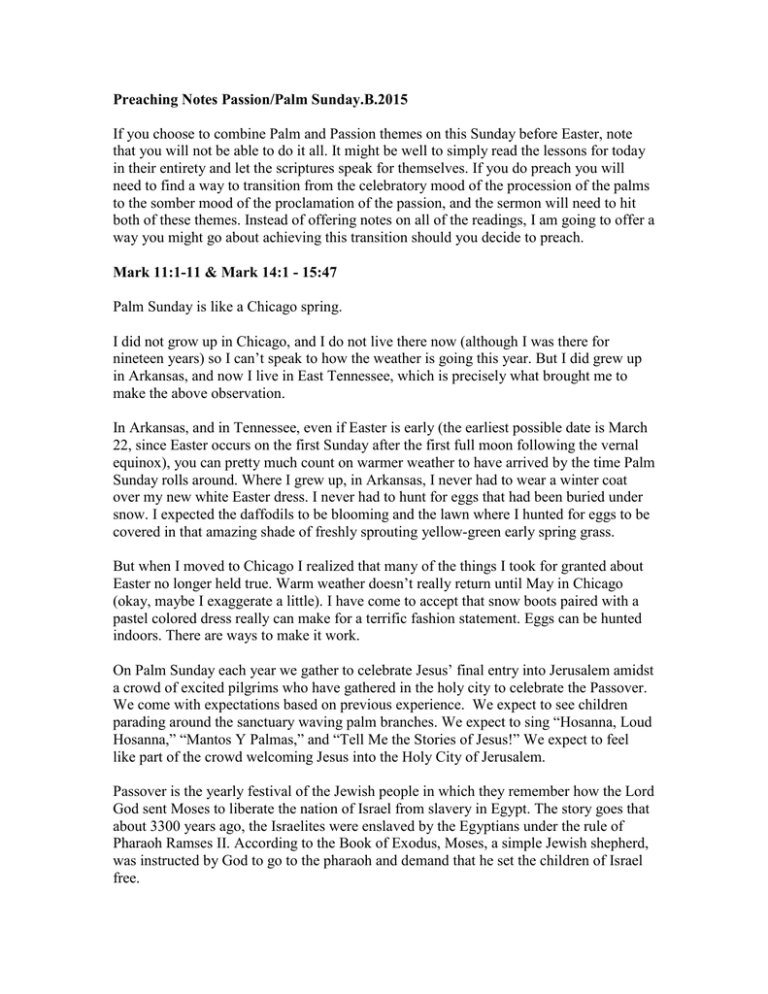
Preaching Notes Passion/Palm Sunday.B.2015 If you choose to combine Palm and Passion themes on this Sunday before Easter, note that you will not be able to do it all. It might be well to simply read the lessons for today in their entirety and let the scriptures speak for themselves. If you do preach you will need to find a way to transition from the celebratory mood of the procession of the palms to the somber mood of the proclamation of the passion, and the sermon will need to hit both of these themes. Instead of offering notes on all of the readings, I am going to offer a way you might go about achieving this transition should you decide to preach. Mark 11:1-11 & Mark 14:1 - 15:47 Palm Sunday is like a Chicago spring. I did not grow up in Chicago, and I do not live there now (although I was there for nineteen years) so I can’t speak to how the weather is going this year. But I did grew up in Arkansas, and now I live in East Tennessee, which is precisely what brought me to make the above observation. In Arkansas, and in Tennessee, even if Easter is early (the earliest possible date is March 22, since Easter occurs on the first Sunday after the first full moon following the vernal equinox), you can pretty much count on warmer weather to have arrived by the time Palm Sunday rolls around. Where I grew up, in Arkansas, I never had to wear a winter coat over my new white Easter dress. I never had to hunt for eggs that had been buried under snow. I expected the daffodils to be blooming and the lawn where I hunted for eggs to be covered in that amazing shade of freshly sprouting yellow-green early spring grass. But when I moved to Chicago I realized that many of the things I took for granted about Easter no longer held true. Warm weather doesn’t really return until May in Chicago (okay, maybe I exaggerate a little). I have come to accept that snow boots paired with a pastel colored dress really can make for a terrific fashion statement. Eggs can be hunted indoors. There are ways to make it work. On Palm Sunday each year we gather to celebrate Jesus’ final entry into Jerusalem amidst a crowd of excited pilgrims who have gathered in the holy city to celebrate the Passover. We come with expectations based on previous experience. We expect to see children parading around the sanctuary waving palm branches. We expect to sing “Hosanna, Loud Hosanna,” “Mantos Y Palmas,” and “Tell Me the Stories of Jesus!” We expect to feel like part of the crowd welcoming Jesus into the Holy City of Jerusalem. Passover is the yearly festival of the Jewish people in which they remember how the Lord God sent Moses to liberate the nation of Israel from slavery in Egypt. The story goes that about 3300 years ago, the Israelites were enslaved by the Egyptians under the rule of Pharaoh Ramses II. According to the Book of Exodus, Moses, a simple Jewish shepherd, was instructed by God to go to the pharaoh and demand that he set the children of Israel free. Moses' plea of let my people go was ignored. So Moses warned Pharaoh that God would send severe punishments to the people of Egypt if the Israelites were not freed. Again Pharaoh ignored Moses' request of freedom. In response God unleashed a series of ten terrible plagues on the people of Egypt. The first nine attempts—blood, frogs, gnats, flies, pestilence, boils, hail, locusts, and darkness—failed. Even after all of these disasters Pharaoh refused to free the Jewish slaves. Nothing worked until the last plague, the slaying of the first-born sons. The festival’s name, Pesach, which means "passing over" or "protection" in Hebrew, is derived from the instructions given to Moses by God. In the final attempt to compel Pharaoh to free the Israelites, Moses announced God’s intention to kill the first-born of every human and beast born on the tenth day of the newly established first month. To protect themselves, the Israelites were told to mark their dwellings with lamb's blood so that God could identify and "pass over" their homes. After this, Pharaoh finally agreed to let the people go. Every year at Passover Jewish people remember and engage in a ritual celebration of this event. It is said that when Pharaoh freed the Israelites, they left in such a hurry that they could not wait for bread dough to rise (leaven). In commemoration, during Passover no leavened bread is eaten. This is why Passover is called the feast of unleavened bread in the Old Testament, and the reason Matzo (flat unleavened bread) is eaten during Passover. So the context for Jesus’ triumphal entry into Jerusalem was the celebration of this festival. It was a time of great joy, celebration and hope for renewal among the Jewish people. It is this setting, this mood which is absolutely filled with excitement, joy, anticipation and hope, into which Jesus comes riding through the crowd on the back of a colt, and the crowds of joyous pilgrims welcome him like royalty by creating a kind of “red carpet” path before him by throwing their cloaks on the ground as he approaches. For Christians, this setting is the fulfillment of a couple of Old Testament predictions: Zechariah, who prophesied that the promised Messiah of Israel would come to Jerusalem humble and riding on a donkey, a colt, the foal of a donkey. And the laying before Jesus of the cloaks and palm branches, which connects Jesus’ entry into Jerusalem with the processions of the kings and the religious festivals that had happened before in Israel’s history. It is important to be familiar with all of this history in order to not miss the meaning of the story, which is to make it absolutely clear that Jesus was, in fact, the fulfillment of God’s promise to the people of Israel. Jesus is, for those who confess him as Lord and Savior, the promised Messiah sent to lead God’s people to liberation once and for all. So there is this kind of elation about this day that we feel every year when we see the children come parading into our sanctuaries as we re-enact the day by waving palm branches and singing “Hosanna! Alleluia! Blessed is the one who comes in the name of the Lord! Blessed is the coming kingdom of our ancestor David! Hosanna in the highest heaven!” It is a glorious day! But alas, as I said before, Palm Sunday is kind of like a Chicago Spring. What I mean by that is that it is one glorious day stuck in the middle of a whole lot of not-so-glorious days. Chicagoans are a hardened bunch. They watch the news and so they know that spring officially commenced on March 20. They know that eventually it is going to get warmer and stay warmer. They have hope that the snow is going to finally all melt away, and the grass is going to start growing, and the trees are going to be covered once again with those tender young leaves, and the flowers are going to pop up and bud and flower. They believe, just as surely as they believe that the Cubs will one day win the World Series, that warmer days will eventually come and stick around for a while. By the time Palm Sunday arrives they are starting to believe that the time of fulfillment is near. But even though they know in their heads that it is already officially spring, in their reality spring has not yet arrived. Most years they will get a glimpse of spring’s glory here and there and that keeps them going. God usually grants them one or two glorious days in March, days where it is 70 degrees and sunny, just to keep them from losing hope. On those sacred days they all dig out their shorts and t-shirts and go outside. And those glimpses of glory, those glimpses of the promise that is coming but has not yet commenced, enable them to survive the twelve more inches of snow that suddenly fall the second week in April. That’s what Palm Sunday is like. It’s a fluke. It is like a 70 degree, sunny, early spring day in Chicago. It is one day of glorious sunshine that gives everyone just enough hope to make it through another month of winter. Palm Sunday marks the start of most wintery week of the year for Christians: the beginning of Holy Week. This is the week that we have to walk with our Lord into the terrible events that lead to his final gathering with his disciples, the last supper, his arrest and trial, his conviction, crucifixion and brutal death on a cross, and his burial in a dark, cold tomb. But this particular day is filled with wonder. Palm/Passion Sunday. It’s like a beautiful Chicago spring day in March. It’s the calm before the storm, the eye of the hurricane, a brief respite before we forge ahead into this most difficult of weeks. So now that we’ve celebrated the triumph we have to begin the turmoil. The forecast for the week ahead is difficult. So let us take a deep breath, hold on to the hope of resurrection, and prepare our hearts to listen as we get a glimpse of the events that lie between today and next Sunday. Read Mark 14:1 - 15:47.
